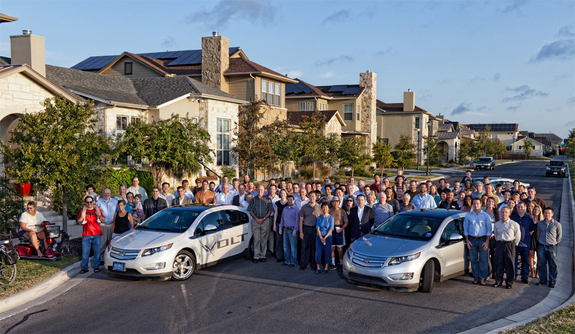Green Tech Test Town Shows Electric Cars Sap Grid

One green tech test bed neighborhood in Texas is now offering up its first insights to the researchers monitoring it. It turns out that people tend to plug in their electric cars at the same time they turn on everything else electronic in their houses. If more people own electric cars in the future, such habits could leave utility companies unable to meet demand, researchers found.
Mueller is a planned community three miles away from downtown Austin. In July, General Motors and a research group called Pecan Street Inc. announced they were installing high-tech meters in Mueller homes for a five-year study of people's energy use and the feasibility of a computer-controlled "smart grid." The meters recorded data every 15 seconds, Scientific American reported. The U.S. Department of Energy and Pecan Street members — including the University of Texas, Austin Energy, Austin Technology Incubator and others — gave a total of $24.4 million to support the project.
Now, researchers are analyzing their first set of data, which is about when people plug in their electric cars, Scientific American reported. About 10 percent of Mueller households use a plug-in electric vehicle, more than 90 percent of which are Chevrolet Volts. Pecan Street offered Mueller residents a $7,500 rebate for the Volts, the New York Times reported.
People tended to plug in their cars between 3 p.m. and 8 p.m., at the same time they turned on their TVs, computers, air conditioners and other appliances, researchers found. They had the same car-charging habits on weekdays as they did on weekends.
The amount of electricity people used would be enough to sap utilities' ability to meet demand if 15 or 20 percent of residents had an electric car, Brewster McCracken, executive director of Pecan Street, told Scientific American.
Pecan Street will now study how utilities and lawmakers can fix the problem without discouraging people from buying electric vehicles in the first place, McCracken said. For example, offering incentives to buy solar panels for charging the cars may work, Scientific American wrote.
Sources: Scientific American, Pecan Street, New York Times
Sign up for the Live Science daily newsletter now
Get the world’s most fascinating discoveries delivered straight to your inbox.
This story was provided by InnovationNewsDaily, a sister site to Live Science. Follow InnovationNewsDaily on Twitter @News_Innovation, or on Facebook.










